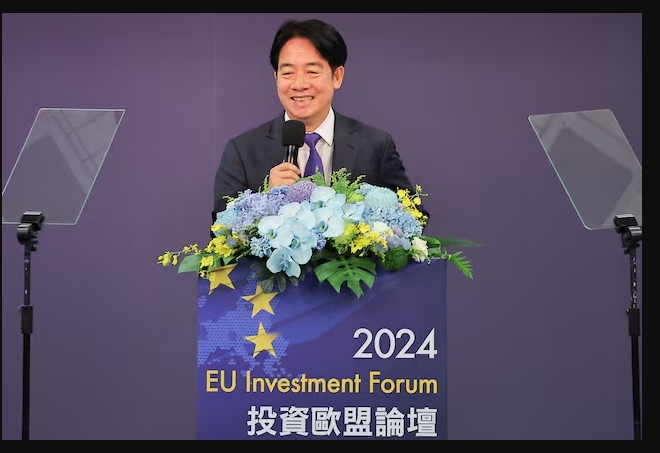Taiwan Pushes for Economic Partnership Agreement with the EU to Strengthen Semiconductor Cooperation
Taiwan President Lai Ching-te has called for the signing of an economic partnership agreement (EPA) with the European Union, aiming to boost bilateral cooperation in critical industries like semiconductors and artificial intelligence (AI). In a speech delivered at a Taiwan-EU investment forum in Taipei on Monday, Lai emphasized the importance of collaboration between like-minded democracies, especially in light of growing global geopolitical tensions.
Lai highlighted the urgency of building secure supply chains for democracies around the world, stressing that Taiwan and the EU must work together to counter the rise of authoritarianism. “We must form a ‘strong democratic umbrella’ to ensure the stability and resilience of global supply chains,” Lai said. He proposed that an economic partnership with the EU would create a solid foundation for future collaboration in high-tech sectors, including semiconductors, AI, and beyond.
Strengthening Semiconductor Ties
Taiwan has long been a leader in semiconductor manufacturing, and its flagship company, Taiwan Semiconductor Manufacturing Co. (TSMC), plays a central role in driving global tech innovation. In August, TSMC opened a state-of-the-art chip plant in Dresden, Germany, which is poised to become a major supplier to European industries, including the automotive sector. Lai sees this as a prime example of how closer ties with the EU could strengthen both economies and contribute to global tech security.
“Looking to the future, Taiwan hopes to take an innovative approach to deepen our cooperation with the EU through a comprehensive economic partnership,” Lai added. He believes that such an agreement would not only bolster economic security for both sides but also enhance their resilience to external shocks, making the global supply chain more secure and reliable.
EU’s Growing Interest in Taiwan
Despite Taiwan’s diplomatic isolation and limited formal recognition on the international stage—largely due to China’s objections—the EU has been increasingly engaging with Taiwan as a strategic partner. Under the European Chips Act, the EU has sought to diversify its semiconductor supply chain and reduce its reliance on Asia. While formal ties remain absent, the EU views Taiwan as a critical partner in its efforts to bolster its own semiconductor capabilities.
Maria Martin-Prat, the deputy head of the European Commission’s Directorate-General for Trade, expressed support for the strengthening of Taiwan-EU relations in a video message at the event. However, she did not specifically address the possibility of an economic partnership agreement. She did, however, affirm that Taiwan is a “trusted partner” for the EU, especially in promoting economic security in the face of rising global uncertainties.
Taiwan’s Limited Trade Agreements
Although Taiwan has struggled with diplomatic recognition and has few free trade agreements (FTAs) in place, it has been active in seeking new trade partnerships. Last year, Taiwan signed an Enhanced Trade Partnership with the UK and has applied to join the Comprehensive and Progressive Agreement for Trans-Pacific Partnership (CPTPP), a key trade bloc in the Asia-Pacific region.
The potential EPA with the EU would mark a significant step for Taiwan, enhancing its international trade relations and helping to secure its position as a critical player in the global semiconductor and technology sectors.
Conclusion: A Strategic Move for Taiwan and the EU
As Taiwan looks to secure its future in a rapidly changing global landscape, an economic partnership with the European Union represents an opportunity to strengthen both sides’ technological prowess and economic resilience. The EU’s strategic interest in Taiwan’s semiconductor capabilities, coupled with Taiwan’s commitment to innovation, could provide the foundation for deeper, more impactful cooperation.
For Taiwan, the move toward an economic partnership with the EU could also help counterbalance its diplomatic isolation, offering a platform for greater participation in global trade and economic agreements. While the discussions around a formal partnership are still in the early stages, the direction is clear: Taiwan and the EU, as fellow democracies, have much to gain from closer collaboration in technology, security, and economic growth.

